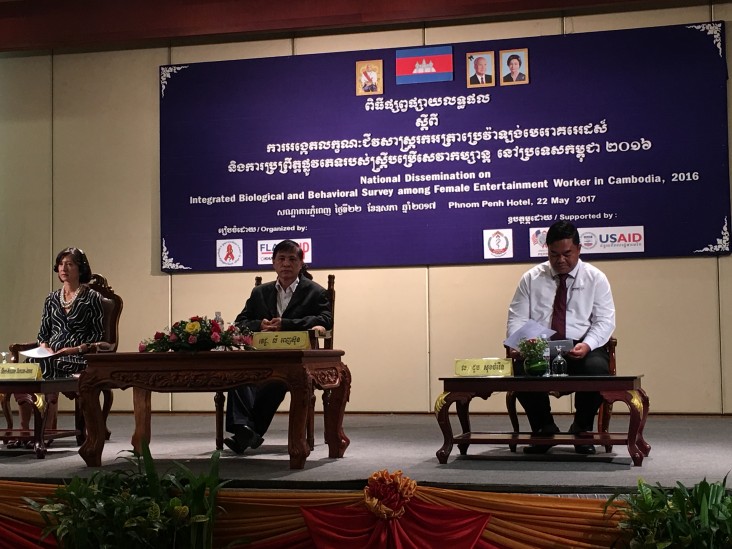Speeches Shim

(as prepared for delivery)
- Dr. Ly Penh Sun, Director of National Center for HIV/AIDS, Dermatology and STD
- Mr. Choub Sok Chamreun, Executive Director of KHANA and Chief of Party for the Cambodia HIV/AIDS Flagship project
- Distinguished guests, ladies and gentlemen
I am very pleased to be here to hear the results of the much needed Entertainment Worker Integrated Behavioral and Biological Survey. This survey will help guide Cambodia towards the goal of eliminating HIV/AIDS by 2020.
As we all know, female entertainment workers represent a very important key population for addressing HIV in Cambodia.
These periodic surveys of HIV behavior and prevalence have been very influential for programming. They provide us with the latest data on progress as well as show us gaps in HIV prevention, testing, and treatment. As you may recall, the 2010 survey had a great impact on the shape of USAID HIV programming.
Soon after first arriving in Cambodia three years ago, I attended the launch of the mHealth tools and visited a number of SMARTgirl sites. I was, and continue to be, impressed by the work that KHANA and civil society partners through Flagship and the Global Fund are doing with entertainment workers to prevent and detect HIV, reduce unintended pregnancies, and support entertainment workers living with HIV.
USAID’s project PRASIT used substantial data analysis to design the SMARTgirl Program in 2009 to address the impact of HIV among entertainment workers in Cambodia. SMARTgirl has since been widely implemented, and the brand is attractive and reflects a non-judgmental and positive image of the entertainment worker. SMARTgirl has created loyalty, easy access to referrals, and trust-worthy information delivered through trained peers.
As entertainment workers are very mobile, the SMARTgirl brand gives them the ability to quickly find similar support in a new location. The SMARTgirl brand was developed for Cambodia with USAID technical support and it belongs to the national HIV/AIDS response - not any one organization or project. We hope that NCHADS will continue to benefit from the SMARTgirl brand nationwide.
Since the last such survey in 2010, much has changed. The Commune Safety Act shut down brothels, entertainment workers shifted to entertainment venues, streets, parks and some began to arrange “dates” by phone. This required new approaches. The Flagship project introduced new interventions, from community-based HIV testing and the use of a unique identifier code to ensure precise monitoring of service delivery, to GIS mapping, tablet-based risk screening, and access to modern contraceptives. Today, the majority of entertainment workers are routinely reached, tested, and linked to treatment by trained peers. You will see that among entertainment workers, abortion has halved and the use of modern contraception has surged to two-thirds. These trends are very exciting.
The IBBS survey and the results we will hear about today are very important. They offer us an opportunity to carefully review the evidence and find ways to better target, reach, and test at-risk entertainment workers. The discussion today can also help us shape new strategies to encourage healthy behaviors, and improve access to quality healthcare.
I would like to close with a special thank you to NCHADS for organizing this important workshop and to all of you for participating today.
Thank you.
Related Speeches
- Remarks by Menglim Kim, Project Management Specialist, USAID/Cambodia, USAID Greening Prey Lang Final Youth Debate
- Remarks by Ms. Hanh Nguyen, Deputy Mission Director USAID/Cambodia, Health Professional Councils’ Strategic Planning Orientation Workshop
- Remarks by John Eyres, Director, Office of Public Health and Education, USAID/Cambodia, Dissemination Workshop of the Fifth National Strategic Plan for a Comprehensive & Multi-sectoral Response to HIV & AIDS in Cambodia

Comment
Make a general inquiry or suggest an improvement.